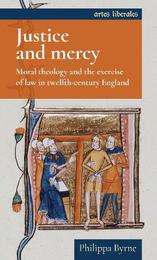
|
Justice and Mercy: Moral Theology and the Exercise of Law in Twelfth-Century England
Hardback
Main Details
| Title |
Justice and Mercy: Moral Theology and the Exercise of Law in Twelfth-Century England
|
| Authors and Contributors |
By (author) Philippa Byrne
|
| Series | Artes Liberales |
|---|
| Physical Properties |
| Format:Hardback | | Pages:304 | | Dimensions(mm): Height 216,Width 138 |
|
| Category/Genre | British and Irish History
History of religion |
|---|
| ISBN/Barcode |
9781526125347
|
| Classifications | Dewey:347.42009021 |
|---|
| Audience | | Postgraduate, Research & Scholarly | |
|---|
| Illustrations |
3 charts
|
|
Publishing Details |
| Publisher |
Manchester University Press
|
| Imprint |
Manchester University Press
|
| Publication Date |
6 November 2018 |
| Publication Country |
United Kingdom
|
Description
This book examines one of the most fundamental issues in twelfth-century English politics: justice. It demonstrates that during the foundational period for the common law, the question of judgement and judicial ethics was a topic of heated debate - a common problem with multiple different answers. How to be a judge, and how to judge well, was a concern shared by humble and high, keeping both kings and parish priests awake at night. Using theological texts, sermons, legal treatises and letter collections, the book explores how moralists attempted to provide guidance for uncertain judges. It argues that mercy was always the most difficult challenge for a judge, fitting uncomfortably within the law and of disputed value. Shining a new light on English legal history, Justice and mercy reveals the moral dilemmas created by the establishment of the common law. -- .
Author Biography
Philippa Byrne is Lecturer in Medieval History at the University of Oxford -- .
Reviews'Justice and Mercy is a remarkable book...the book resounds with the historiographic traditions and conflicts among the different schools of legal history and of intellectual history, both in Britain and on the continent. While the author is obviously well aware of them, she manages to avoid the pitfalls of adding to these ongoing conflicts.' Esther Cohen, Hebrew University of Jerusalem, The Medieval Review 'I dearly wish this excellent book had been available twenty years ago when I was writing one of my own on the changing ways that the human urge to vengeance were expressed c. 1000-1300. Philippa Byrne, a first-time author, has assembled an amazing amount of difficult theological material, much direct from manuscript, to make a persuasive and novel case that judges had to include in their sentencing policy what she calls "reciprocal mercy," a kind of subset of "deliberative" justice, generated in the schools by "a sophisticated and long-running debate about judicial ethics". [...] This is an enviably able, solid, fresh, and exciting first book that will give all kinds of readers much to think about.' Paul R. Hyams, Speculum -- .
|